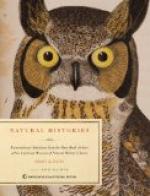“I only know thee humble,
bold,
Haughty, with miseries untold,
And the old curse that left
thee cold,
And drove thee ever to the
sun
On blistering rocks ...
Thou
whose fame
Searchest the grass with tongue
of flame,
Making all creatures seem
thy game,
When the whole woods before
thee run,
Asked but—when
all is said and done—
To lie, untrodden, in the
sun!”
—BRET
HARTE.
[Illustration]
Old Rattler was a snake, of course, and he lives in
the King’s River
Canon, high up and down deep in the mountains of California.
He had a hole behind and below a large, flat granite rock, not far from the river, and he called it his home; for in it he slept all night and all winter, but when the sun came back in the spring and took the frost out of the air and the rocks, then he crawled out to lie until he got warm. The stream was clear and swift in the canon, the waterfalls sang in the side gulch of Roaring River, the wind rustled in the long needles of the yellow pines, and the birds called to their mates in the branches. But Old Rattler did not care for such things. He was just a snake, you know, and his neighbors did not think him a good snake at that, for he was surly and silent, and his big, three-cornered, “coffin-shaped” head, set on a slim, flat neck, was very ugly to see. But when he opened his mouth he was uglier still, for in his upper jaw he had two long fangs, and each one was filled with deadly poison. His vicious old head was covered with gray and wrinkled scales, and his black, beadlike eyes snapped when he opened his mouth to find out whether his fangs were both in working order.
Old Rattler was pretty stiff when he first came from his hole on the morning of this story. He had lain all night coiled up like a rope among the rocks, and his tail felt very cold. But the glad sun warmed the cockles of his heart, and in an hour or two he became limber, and this made him happy in his snaky fashion. But, being warm, he began to be hungry, for it had been a whole month since he had eaten anything. When the first new moon of August came, his skin loosened everywhere and slipped down over his eyes like a veil, so that he could see nothing about him, and could not hunt for frogs by the river, nor for chipmunks among the trees. But with the new moon of September all this was over. The rusty brown old coat was changed for a new suit of gray and black, and the diamond-shaped checkers all over it were clean and shiny as a set of new clothes out to be.




